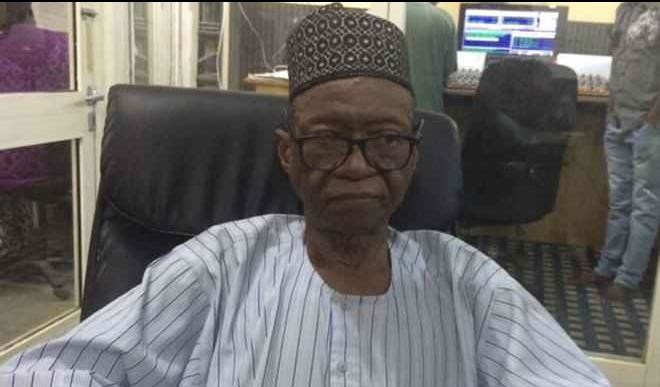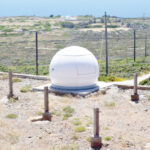
For many of us who came of age in the early 1970s, had access to television and were fluent in the Hausa language, Kasimu Yero, the actor, who died on Sunday, 3rd September defined that period of our youths in many ways. He was an icon of those early years of television in the northern part of the country. For me access to television and knowing Kasimu Yero happened at the same time. I was getting into my late teens when I came into the Samaru Campus of Ahmadu Bello University (ABU), in early 1972, as a student in the School of Basic Studies, and that was where I first set my eyes on a television set. We didn’t have television in Maiduguri where I was born and raised, or Keffi where I had my Secondary school education.
Of course in Maiduguri what we had for night entertainment were the two cinema halls, Elkanemi Cinema, its remains now facing the present Monday Market and the Premier Cinema now a campaign headquarters of sorts on the Dandal, a walking distance from the Shehu’s Palace. Television as a means of entertainment and news I first saw in Zaria and for all the years I lived in both Samaru and later Kongo campus the only television station I knew was Radio-Television Kaduna. A major chunk of what the station broadcasted was in Hausa language and the obvious star was Kasimu Yero who starred in many drama programs of the period.
We had a television set in our hall of residence, ICSA (later renamed Ramat) and every night we congregated around it for the night’s entertainment. We always looked forward to the antics of Kasimu Yero who appeared in the weekly Hausa drama. Kasimu took on a wide range of roles from the comedic to the serious. In whatever garb he took, Kasimu was the ultimate entertainer reducing his audience to laughter or tears as the case might have been.
It was the period after the civil war and the government of the day was trying to solve many social problems. Television was a convenient medium and actors such as Kasimu took the lead in such campaigns usually in the form of short drama presentations. One week you saw Kasimu as a gullible villager being swindled by smart city alecks and another week he turns up as the one outsmarting hapless villagers. It didn’t matter what role, it fitted Kasimu to the bones. Interestingly, Kasimu was not only versatile in acting but he also wrote and produced all those pieces we loved.
But Kasimu was not only on television, he was also always seen physically around on our campus. That made him one of us. He was always seen in the Fine Art Department building which was then just across the road by our classes in the School of Basic Studies. By the time we left university in the mid-1970s, Kasimu’s fame and popularity had gone beyond his Kaduna/Zaria confines to Jos, Maiduguri, and Sokoto where television culture was just taking hold with the expansion of Nigerian Television Authority (NTA) to these cities.
In time Kasimu’s stature would even go beyond the Hausa-speaking parts of the North. A happy convergence of careers between Kasimu Yero and the legendary NTA producer, Peter Igho, would propel Kasimu to national attention. Jos-born Peter Igho was then a producer and writer of drama series in NTA Sokoto in the mid-1970s whose entry, a dance drama, Moment of Truth, had won the first prize for the station in a competition organized for all NTA stations. And when NTA was asked to make a contribution to the government of Shehu Shagari’s Green Revolution Programme, the National Headquarters gave a marching order to its award-winning producer, Peter Igho, to come up with a drama series to popularise the scheme.
The result was Cockcrow at Dawn which arguably was the most popular production of the NTA in the 1980s. Peter was allowed sufficient production independence and he brought in actors like Kasimu, who had previously collaborated with him in other endeavours. Peter had a keen eye for talents and though of Urhobo origins spoke Hausa fluently. He had noted Kasimu’s performance in the short Hausa drama series as well as the bigger productions such as Shehu Umar and Magana Jari Ce. Peter also took along Sadiq Daba who was with him in Sokoto and of course George Mentah, Zainab and a whole cast of some of the best available actors and actresses in Nigeria, then, including my Zaria classmate, Lantana Ahmed.
Cockcrow at Dawn was the first ever series to be shot all on location and where else but Jos which Peter knew very well with its idyllic, picturesque surroundings just excellent for the kind of shots he had in mind. It was also the first television series to be backed with serious money mostly provided by United Bank of Africa as part of its corporate responsibility contribution. The series was a resounding success keeping generations of Nigerians glued to their set for many years.
For Kasimu it was probably the first time he was on national television in an English-speaking role. Kasimu revelled in that exposure and adapted to it like duck to water. It turned out that he possessed the kind of diction you couldn’t pigeonhole to any part of the country and he had an actor’s range whose arc was so wide that he could adjust to any role. He was both a Directors and Producers delight and was said to be at home in any cast. Actors loved to be in his company, as many of them had intimated, there were no dull moments when Kasimu was around.
National fame came to Kasimu which became a key to open the door to many other commanding acting roles. Soon NTA called upon him again to replicate the magnificent manner he acted in the Hausa version of Magana Jari ce, in a fresh English language version that would go nation-wide. Kasimu rose to the challenge splendidly. Magana Jari Ce, as expected, received rave reviews and became a success with viewers as well.
However as the new millennium unfolded it was curtains for the great actor. The new national film industry, Nollywood, Kannywood, and the whole bunch, proliferated with new stars taking the stage, and in that blurred situation actors such as Kasimu took a pensive backseat, ruminating on a productive and successful career.
As we mourn the passage of Kasimu Yero, we need to take a hard look at the legacies of our great artists and chart ways to keep their memories fresh. Our iconic actors are fast depleting and we have no platform where their legacies would endure for successive generations to know about them. We have already lost many memorable members of the cast in that famous sitcom of 1970s, The Village Headmaster – Jab Adu (Bassey Okon), Funso Adeolu (Chief Eleyemi) Joe Layode (Teacher Garuba) Femi Robinson (Headmaster) Elsie Olusola (Sisi Clara) Albert Olayemi (Gorimapa) and the creator of the series himself, Segun Olusola. From The New Masquerade we have already lost John Iroha (Gringory) Claudius Eke (Jegede Sokoya) and the inimitable Christy Essien Igbokwe (Akpenor) who was both a great actress and a celebrated singer as well.
We need a national hall of fame to celebrate our great artists. Our officials in the Arts and Culture arena should make it as part of an urgent agenda.




